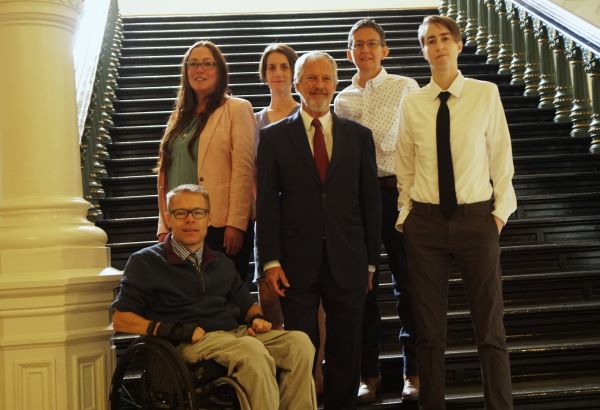Enter your email to receive the CareQuest newsletter:
October 31, 2023
Early on in his 23-year tenure with the Coalition of Texans with Disabilities (CTD), Executive Director Dennis Borel noticed that some of his colleagues and people he socialized with who had disabilities had problems with their oral health.
“I used to see a lot of my folks with missing teeth, sometimes no teeth, broken teeth, stained, bad shape,” Borel said.
He used to think those oral health problems were the result of self-care deficits. For instance, if a person has compromised hands or arms, if they’re paralyzed, or if they don’t see well, they may not be able to take care of their teeth as well as others.
But Borel says he had a wake-up call when he discovered the main reason for those oral health issues: More than 400,000 Texan adults who are enrolled in Medicaid receive little to no dental services — and that number includes thousands of people with disabilities.
“The majority — that’s something like 85% — for their entire adult lifetime, had no dental services in their care plan,” he said. “That was a huge barrier.”
Through grants from CareQuest Institute, CTD has led the charge to change that reality for individuals with disabilities and eliminate other barriers to access health care, including oral health care. Now the organization is working to help implement a preventive dental benefit for Texans enrolled in Medicaid that was passed in 2021.
“Frankly, we couldn’t have done it without CareQuest Institute,” he said.
Working to Improve Oral Health Care
Borel says the push to support people with disabilities is a group effort. He and his team of 10 colleagues work to ensure that Texans with disabilities can work, live, learn, play, and participate fully in the community of their choice. But they don’t do it alone. CTD has had to build partnerships with other organizations and get funding for the work their team does.

“We’re primarily an advocacy organization. We represent a very low-income population. Keeping this organization running is a challenge, and very few places give out grants for advocacy work,” Borel said.
CTD was first awarded a grant from CareQuest Institute in 2017, the same year that CTD made a push for a Medicaid adult dental benefit. At that time, the CTD team began developing relationships with other organizations in Texas to get the topic in front of state legislators. Research they gathered found that money spent on oral health care would be more than offset by savings in acute care, emergency room visits, and hospitalizations.
“We had to start by getting [legislators] to agree to even study the issues,” Borel said. “Then what it came down to was proving to them that oral health care is not a cost; it’s actually a key to a sustainable public health system.”
CTD also encouraged people with disabilities to share their stories directly with state legislators.
“These men and women in the Capitol, they’re pretty far away from your typical public health beneficiary,” he said. “They might say, ‘Oh yes, I know some people with disabilities.’ Yes, they might know a few. But I am one step away from them, and I bring them with me. That’s the story [CareQuest Institute] helped us tell.”
This work led to Texas legislators passing a bill in 2021, which added a preventive dental benefit for Texans enrolled in Medicaid. CTD and other organizations in the state are now working to help implement those benefits. CareQuest Institute continues to support CTD’s work through grant funding, with the most recent grant, “Expanding Dental Services for Adults with Disabilities, Year 5,” in the amount of $73,858.
The Drive to Help People with Disabilities
Borel has a history of working with disadvantaged populations. When he was serving in the Peace Corps, he spent two years in a third-world country teaching children skills to become self-reliant and self-sufficient. He has worked for small volunteer fire departments and an alternative school for dropouts to give them a second chance.
“I’ve worked with all these at-risk populations, these disadvantaged groups,” says Borel. “And when I came to [CTD] I realized I found a group that was even more disadvantaged than low-income minority dropout youth, and that’s individuals with disabilities. That has resonated with me.”
He said that people with disabilities generally have a lower income, have a higher unemployment rate, and are less likely to own their own vehicle or home, compared to people who don’t have disabilities.
“They’re more likely to die prematurely, not from their disability, but from substandard health care,” he said. “Their very civil right to exist free from discrimination based on their disability wasn’t even acknowledged until 1990 with the passage of the Americans with Disabilities Act. And that discrimination still lingers to this day. That’s why this is important work.”
Along with adding a preventive dental benefit for Texans enrolled in Medicaid, CTD has also supported legislation to authorize teledentistry in Texas. That bill passed in 2021, which was another big win for people with disabilities.
“What if that dentist had never met this patient and was just told, ‘Okay, this is a patient who has a disability’?” Borel said. “How valuable is it to have had a teledentistry meeting ahead of time so that dentists can actually visually assess what kind of accommodations would be needed in the dental clinic?”
Borel said CTD’s goal is to continue to make more progress to improve access to care for people with disabilities in the state, from education to transportation to medicine to voting rights.
“Just think of access, and the whole idea is to have a self-directed life so people can choose the community they live in and have enough support to do that,” Borel said. “So, basically, equality.”